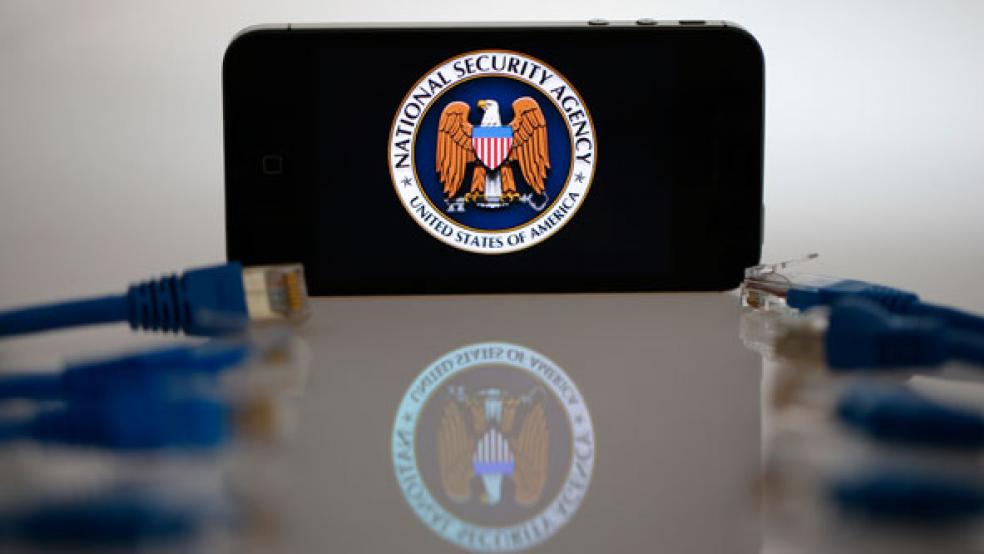Public opinion has turned against the NSA. Widespread spying on ordinary citizens and on friendly world leaders has led a growing majority of Americans to disapprove of the security agency. Even those who, like myself, have given the NSA the benefit of the doubt – assuming that government spooks are only doing what they must to protect us from terrorism – are starting to wonder.
My biggest concern is not that spies are eavesdropping on what I’m planning for dinner – in this Internet age, I’ve relinquished any expectation of privacy – but rather that our intelligence efforts are misdirected or just plain incompetent. The most recent data point: revelations that our super-spies completely missed
According to The Wall Street Journal, though satellites showed troops massing at the Ukraine border, intelligence analysts intercepted no communications from those planning to attack. Shockingly, it appears the Russians evaded our eavesdropping effort.
Related: Obama to Ask for Curbs on NSA Data Collection
That’s the same eavesdropping effort that tapped Angela Merkel’s cell phone and scooped up telephone data from millions of Americans--the data mining that just yesterday President Obama was apologizing for, again. How is this possible? Presumably, we have our monitors directed elsewhere. A senior official said, “We’ve gone into crisis-response mode.”
The Journal reports, “U.S. spy agencies and the military are rushing to expand satellite coverage and communications efforts across Russia, Ukraine and the Baltic states,” hoping to close the “information gap.” Another official is quoted as saying the Obama administration is “very nervous” because “this is uncharted territory.”
What does that even mean? Presumably, since the end of the Cold War we have sensibly directed most of our intelligence gathering towards the Middle East and
It turns out that as early as December there were those warning that Putin might strike in
Related: Phone Calls Can Be Heard by NSA a Month Later
On February 28, President Obama yet again warned Putin against invading Crimea; by then the peninsula was fully controlled by Russians. Security head Clapper’s office, according to the Journal, could not say with “high confidence” that the takeover had occurred.
Talk about a complete security bust. It makes you wonder where else we are vulnerable. It also raises questions: are we bad at listening in, or are we spread too thin? Since we’re spending about $70 billion annually for our intelligence gathering, that’s hard to imagine. Or…are other countries further ahead in these technologies? In his lengthy January speech about the NSA, President Obama claimed, “America’s capabilities are unique…” Are they?
There are other reasons to doubt our intelligence community, starting with the Arab Spring. As uprisings in Tunisia, Libya, Egypt and elsewhere ignited, the United States appeared consistently surprised. How about this? In 2011, it took more than two days for the U.S. to find out that North Korea leader Kim Jong-il had died; reports from the North Korean news media slowly trickled out. North Korea is an especially closed country, but isn’t that the kind of place – especially given its nuclear weapons – where we should have intelligence capabilities?
Related: China Huawei Condemns Reported NSA Snooping
It is impossible to know whether our data gathering has been deficient, or whether those charged with interpreting and responding to the flow of information have been derelict. President Obama came into office desperate to pluck the United States from entanglements in Iraq and Afghanistan. He viewed his predecessor and historical transgressions as responsible for America’s rocky relationships with our adversaries. His worldview has been little altered by events. He declares the global war on terror over, though we daily confront hostilities both actual and virtual. His myopia may impact our intelligence posture--we know it has led to ineffectual policies and worsening relations with Syria, Egypt, Saudi Arabia, Afghanistan, Iraq and Russia, among others.
The NSA of course is just one of many agencies providing intelligence, but it is our lead eavesdropper. The agency’s credibility suffered from the data dump provided by Edward Snowden. But that the former operative was allowed access to such a monster cache of sensitive documents, and that he was able to release them to the media, is in itself a travesty. His boss at the CIA, where Snowden worked before joining the NSA, sent him home from
In his January speech, President Obama attempted to convince Americans and our allies of our commitment to walking that fine (maybe impossible) line between security and privacy. To his credit, he did not back down from our right to collect and analyze data. Obama promised that the
We surely hope that doesn’t include Putin.
Top Reads from The Fiscal Times:






